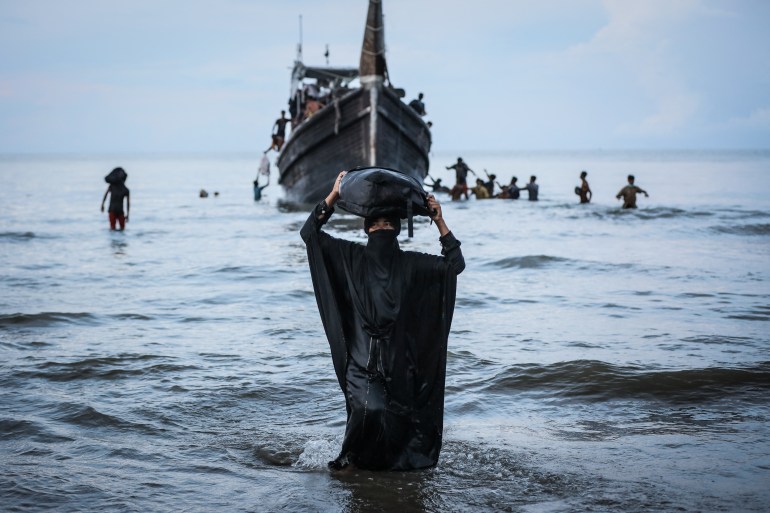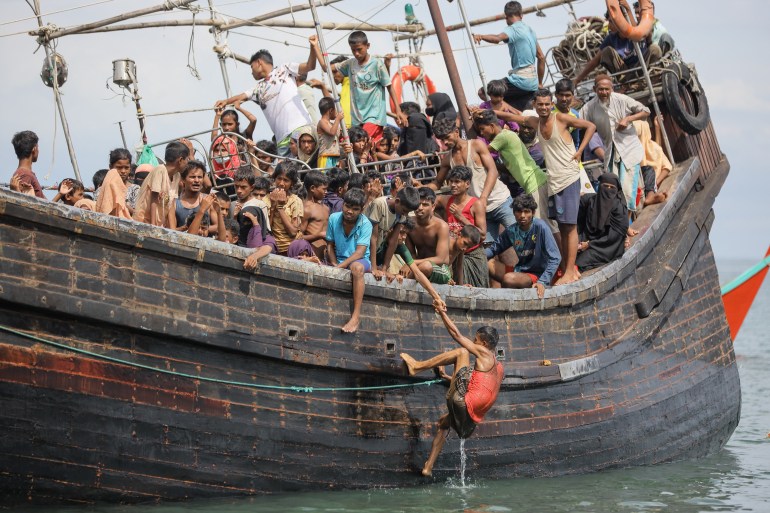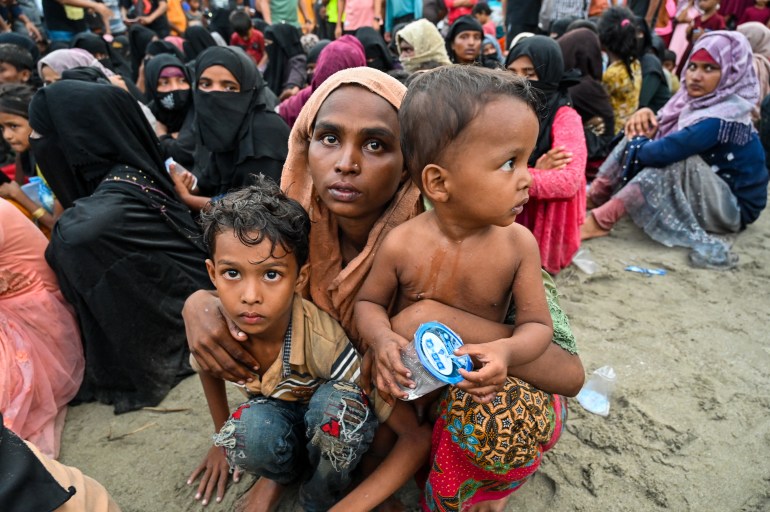Medan, Indonesia – Indonesia is facing a renewed refugee crisis after the arrival of three boats in as many days with nearly 600 Rohingya people on board.
Two of the boats, the first with 146 passengers and the second with 194, were able to land on beaches in Pidie on Aceh’s east coast on Tuesday and Wednesday, with refugees including women and children pictured collapsed on the sand after reportedly spending a month at sea.
On Thursday, a third boat carrying some 249 people was met with resistance from locals in Bireuen who refused to allow it to land and pushed the vessel back out to sea.
When the boat tried to land a second time – a little further south at Muara Batu – and refugees staggered onto the beach, they were lined up and escorted back, according to witnesses on the ground. Fishermen at the beach handed some of the refugees packets of food and bottles of water, but the situation continued to escalate late into the evening.
In video footage sent to Al Jazeera by aid workers on the beach, hundreds of refugees then jumped off the boat and swam ashore, staging a sit-in on the sand.
Late in the evening, under the cover of darkness, more footage showed emaciated people, some who could barely walk, being dragged into the sea by residents and forcibly returned to their boat. Refugees on the beach, including children, prayed and cried as they begged to be allowed to remain in Aceh, which lies on the tip of Sumatra island and is Indonesia’s most western province.
The situation appeared more volatile than in previous years, with refugees and residents shouting at each other, and refugees clinging to each other in an effort to avoid being marched into the water.
The people of Aceh have previously welcomed refugees, who are taken to a temporary camp before they are usually moved to other parts of Indonesia, but tensions have been escalating in recent years as more and more Rohingya have arrived.
Azharul Husna, the coordinator of the Commission for Missing Persons and Victims of Violence (KontraS) in Aceh, said that the area had seen about 30 boat arrivals between 2009 and 2023, but the frequency had increased since the February 2021 military coup in Myanmar.
“Previously, we would see one arrival a year, or two arrivals a year, but now we are seeing four or five boats arriving annually,” she said.

Arrivals typically peak from November to February, Husna said, as many refugees try to flee during the monsoon season when winds pick up and carry boats more quickly across the Andaman Sea from Bangladesh, where hundreds of thousands have been living in squalid camps since a 2017 military crackdown in Myanmar.
However, the monsoon season also brings heavy rain and storm swells, making sea crossings perilous, especially for people travelling in barely seaworthy boats.
‘Troubling’
It is rare to see so many arrivals in such a short space of time at the start of what is known as the sailing season, and refugee experts predict more boats could arrive in the coming months, given the difficult conditions in Bangladesh and the worsening crisis in Myanmar.
In a statement sent to Al Jazeera, KontraS Aceh said that one of the issues was that the government had no comprehensive plan to deal with the refugees, despite a 2016 presidential decree that states that the government will collaborate with institutions such as the United Nations and other international organisations to handle arrivals.
Article 9 of the Indonesian presidential decree explicitly states that refugees who are found in an emergency situation at sea should be given emergency aid and allowed to land on Indonesian soil if they are in danger.
Indonesia is not a signatory to the 1951 Refugee Convention or the ensuing 1967 Protocol.
“When the government is silent and lets this problem drag on, this kind of rejection happens and it is very troubling,” KontraS Aceh’s Husna said.
“When the government just shuts its eyes to what is happening, especially allowing refugees to be returned to the ocean, it clearly demonstrates a lack of empathy and the country’s commitment to upholding human rights is questioned.”
KontraS Aceh said it urged the government to help the refugees and immediately ratify the 1951 Refugee Convention.

Meanwhile, Lilianne Fan, the co-founder of the humanitarian organisation, Geutanyoe Foundation, told Al Jazeera that it was “sad to see the refusal for disembarkation in Aceh and the harsh treatment of Rohingya refugees by locals who have a tradition of welcoming anyone in need of help”.
According to the principle of non-refoulement, countries are forbidden from returning refugees or asylum seekers to a country where they would be in danger of persecution, although Fan told Al Jazeera that this would not apply in this case, as the refugees were not being forced to return to Myanmar.
She added that the pushback from locals in recent years was perhaps understandable, because some people had been prosecuted and imprisoned after being accused of human trafficking after helping refugees on to dry land.
“It is not very surprising given that there has been very little support for Acehnese communities and local governments for a proper refugee shelter after many years of taking refugees in with open arms,” she said. “There has also been a feeling that they have been punished for helping, as many have been accused of abetting smuggling networks.”
In a statement on Thursday, Indonesia’s foreign ministry said that it had no obligation or capacity to accommodate refugees or provide a permanent solution for their resettlement.
“Temporary shelters that have been provided all this time [by Indonesia] were for humanitarian reasons,” Lalu Muhamad Iqbal, a ministry spokesperson, said. “Ironically, many countries that are signatories to the refugee convention have closed their doors and used a push-back approach to refugees.”
Thailand and Malaysia, a popular destination for the Rohingya, have previously pushed back boats of refugees, but neither country is a signatory to the UN refugee convention.

In Europe, however, where many countries are signatories, governments are trying to prevent people from crossing the Mediterranean or the English Channel in small boats, while Australia has long maintained a policy of refusing those who arrive by boat the chance to settle in the country.
“In Indonesia’s experience in handling refugees, we have found that Indonesia’s kindness in providing temporary shelter has been exploited by human trafficking networks,” the spokesman added.
Aid workers on the ground in Aceh told Al Jazeera that they were still trying to confirm the location and status of the third boat.









